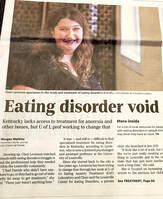Eating Anxiety Treatment (EAT) Laboratory & Clinic
Welcome to the EAT Lab and Clinic located at the University of Louisville
and directed by Dr. Cheri A. Levinson, Ph.D.
and directed by Dr. Cheri A. Levinson, Ph.D.

Novel Treatment Development for the Eating DisordersExposure therapy is the treatment of choice for anxiety disorders. At the EAT Lab we are working on ways to adapt exposure therapy for the treatment of eating disorders. We are also interested in adapting other empirically-based treatments for the anxiety disorders and extending them to the eating disorders.
|
Personalizing Eating Disorder TreatmentTreatments for eating disorders only work for about 50% of individuals. Part of the reason that treatments fail is because of the high heterogeneity among eating disorders. Our work, using network analysis, is focused on identifying how symptoms of eating disorders differ within individuals and using this to inform personalized treatment.
|
Eating Disorder & Anxiety Disorder ComorbidityMore than 70% of individuals with eating disorders also meet criteria for an anxiety disorder. Our lab studies why these two types of disorders co-occur so frequently. Our ultimate goal is to develop treatments and preventative interventions that address both disorders concurrently.
|

|
Taking eating disorders seriously.
Online article here! |




